Classical Guitar Repertoire Lessons Grade 1 (PDF)
Classical Guitar Repertoire Lessons Grade 1 (PDF)
Couldn't load pickup availability
Classical Guitar Repertoire Lessons Grade 1 - Lessons and pieces in notation with fingering. There is also a separate tab supplement at the end which includes pieces (not the lessons). Watch the free video lessons. This item is a PDF Download. 39 Pages. 2019 Edition.
Hardcopy (Grade 1-2) available via: Amazon.com, Amazon.ca, Amazon.co.uk, Amazon.de, Amazon.au, and more local Amazon stores.
About & Level: This book teaches classical guitar repertoire at approximately the grade one level. This level is for students who have completed both my Volume 1 and Volume 2 method books (some may consider this to be early-intermediate). The pieces in this book appear in a progressive order starting with easy pieces and slowly introducing new techniques, oddity fingerings, or increased activity. The main goal is to teach students how to practice their repertoire by breaking it down into separate elements. Check out the samples in the image gallery to your left. Keep in mind that this book has no connection to other graded systems, some selections are harder or easier for variety and skill development.
Contents - Each piece has two or three pages of lessons followed by a proper performance edition of the piece.
- The Spanish Pavin (Anonymous) - Melody-focused Renaissance dance
- Lección 75 by Julio Sagreras - Melody combined with arpeggios and chords (Argentina)
- Lección 70 by Julio Sagreras - Three-voice texture with a clear melody
- Ècossaise Op.33, No.2 by Mauro Giuliani - Simple slurs and muted bass strings
- Lección 19 by Dionisio Aguado - Arpeggio etude with three-voice chords
- La Tirantine by Adrian Le Roy - Renaissance dance with melody and full chord shapes
- Andantino Op.241, No.5 by Ferdinando Carulli - Increased activity, melody and alberti bass
- Exercise No.11 by Napoléon Coste - A brief foray into upper positions
Video Lessons for this Book
-
Lesson: The Spanish Pavin (Anonymous)
-
Lección 75 by Julio Sagreras
-
Lección 70 by Julio Sagreras
-
Ècossaise Op.33, No.2 by Mauro Giuliani
-
Lección 19 by Dionisio Aguado
-
La Tirantine by Adrian Le Roy
-
Andantino Op.241, No.5 by Ferdinando Carulli
-
Exercise No.11 by Napoléon Coste
FAQ:
Should I memorize the pieces and should I keep them in my repertoire? Although I'm not strict about memorization with my students, I do believe that we play better when the piece is memorized. Also, our brains seem to get used to it as a habit and memorizes more efficiently if we do it regularly. So, I highly recommend you memorize your pieces but don't be too hard on yourself, just do a little bit of memory work everyday and see how it goes.
When should I move onto the next piece? Aim for a confident playing of the piece. As a basic check you might put a metronome on and be able to play through it as that is a common issue. Aim for an even rhythm, nice tone, arched phrases, and a prominent melody. I encourage students to stick with pieces for awhile to see how they 'settle' into the piece in terms of relaxation. It's important to dive deeper into musicality after you have accomplished the basic physical movements. A large part of what teachers do is to just raise the musical bar and get students to strive for higher levels of musicality so you'll want to push yourself in that regard to ensure you are not just settling for a past standard (up your personal level every piece). In the end it's up to you but try to feel confident and happy with your performance.
Cover image is just for promotion, the PDF is a text cover.
Share
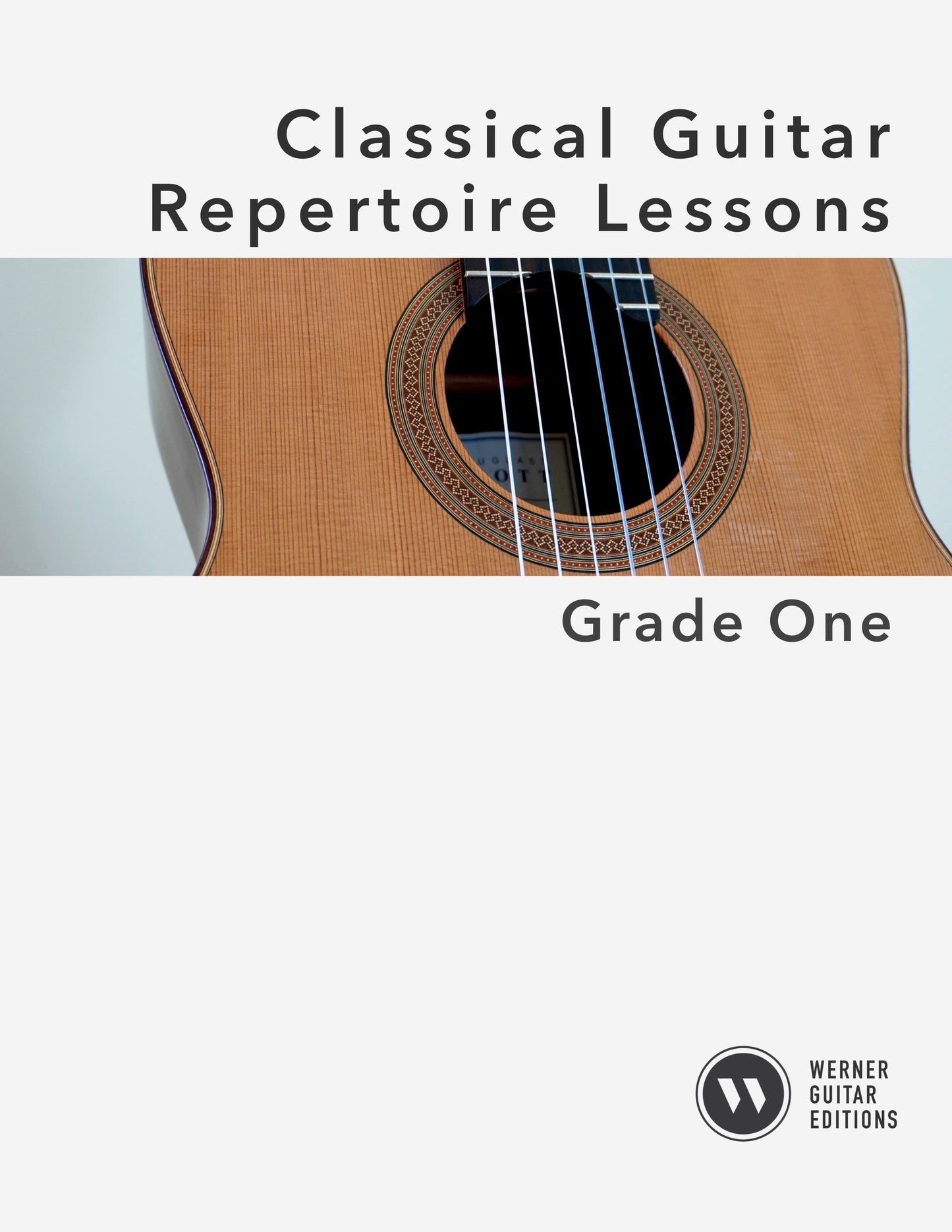
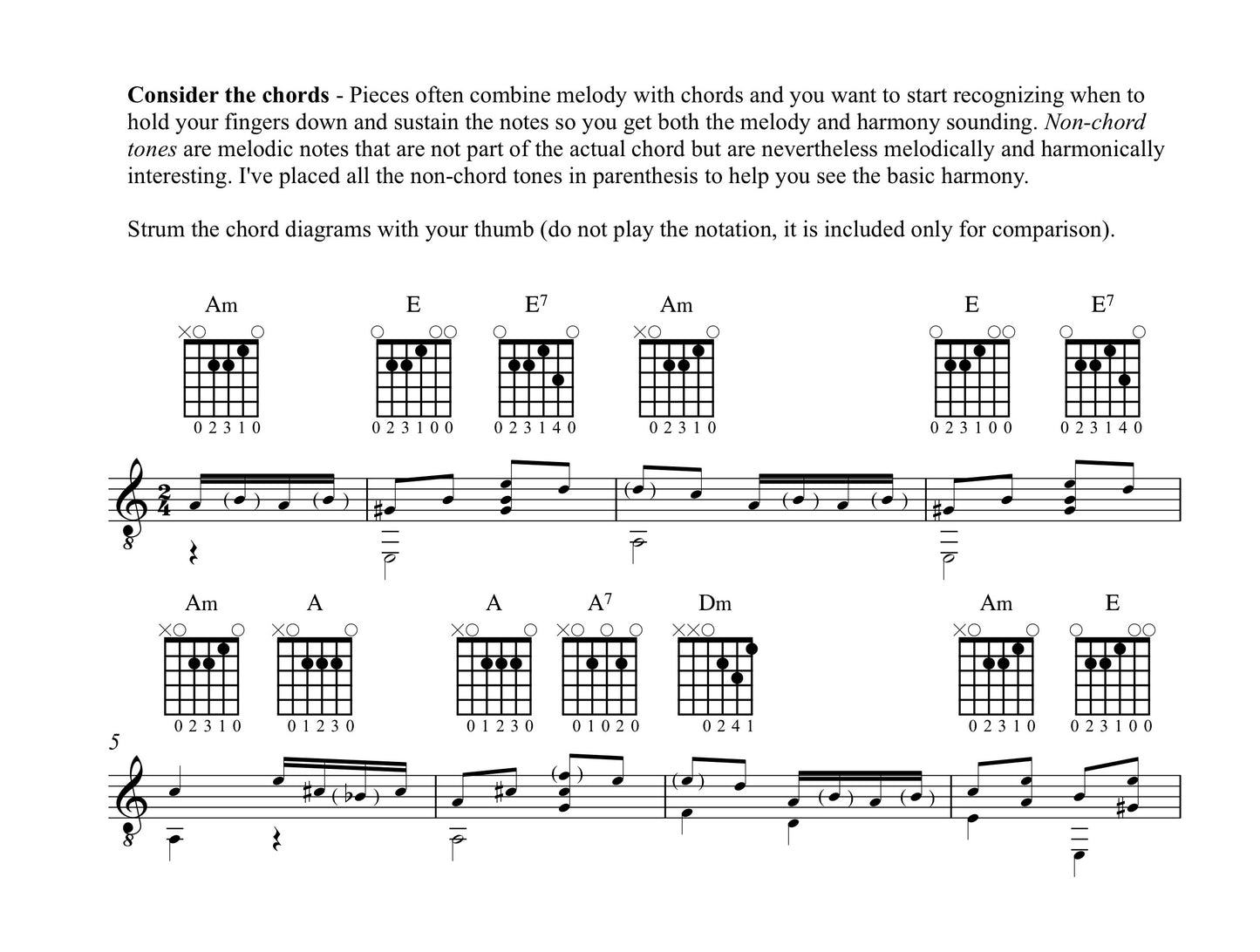
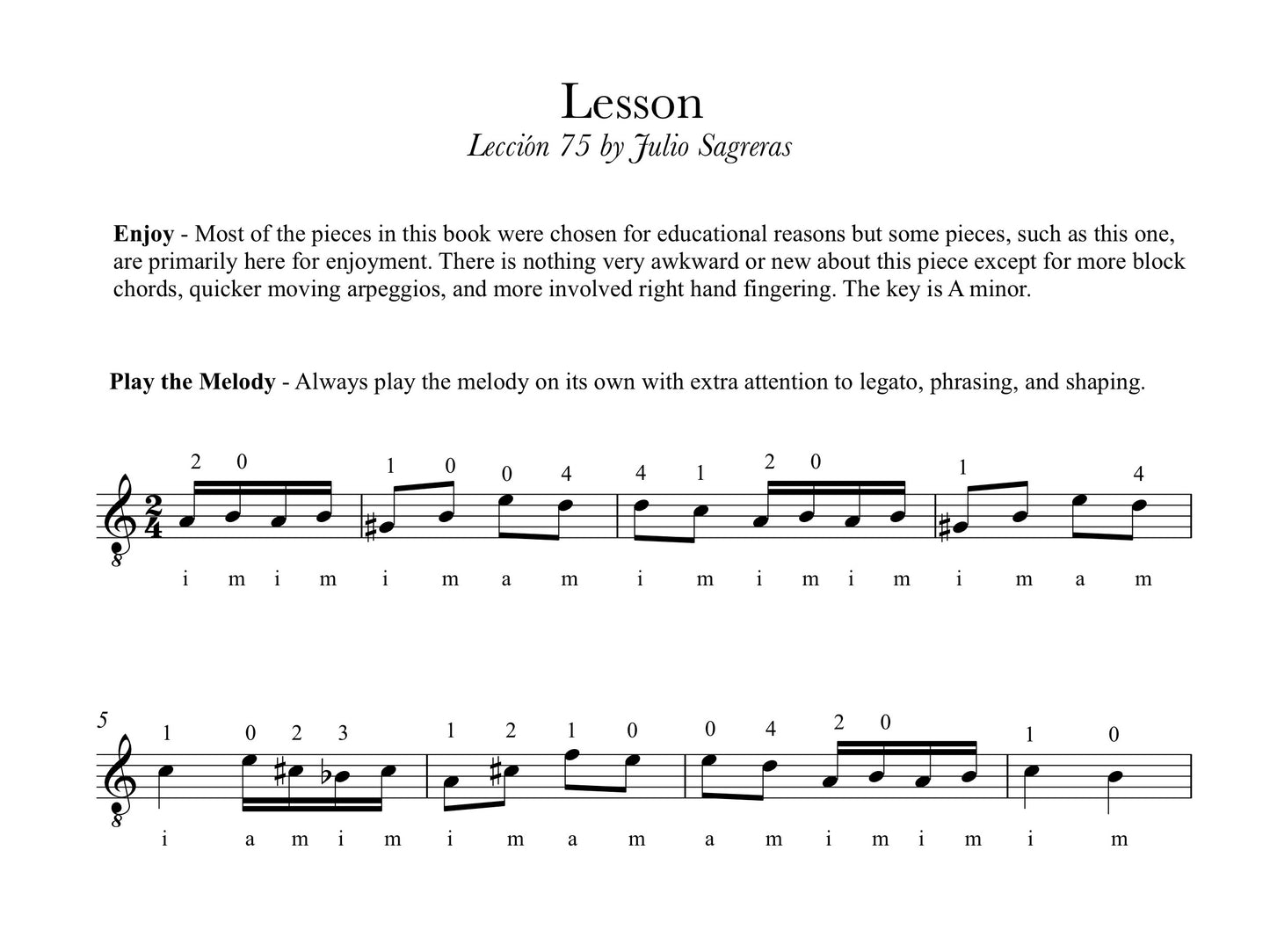
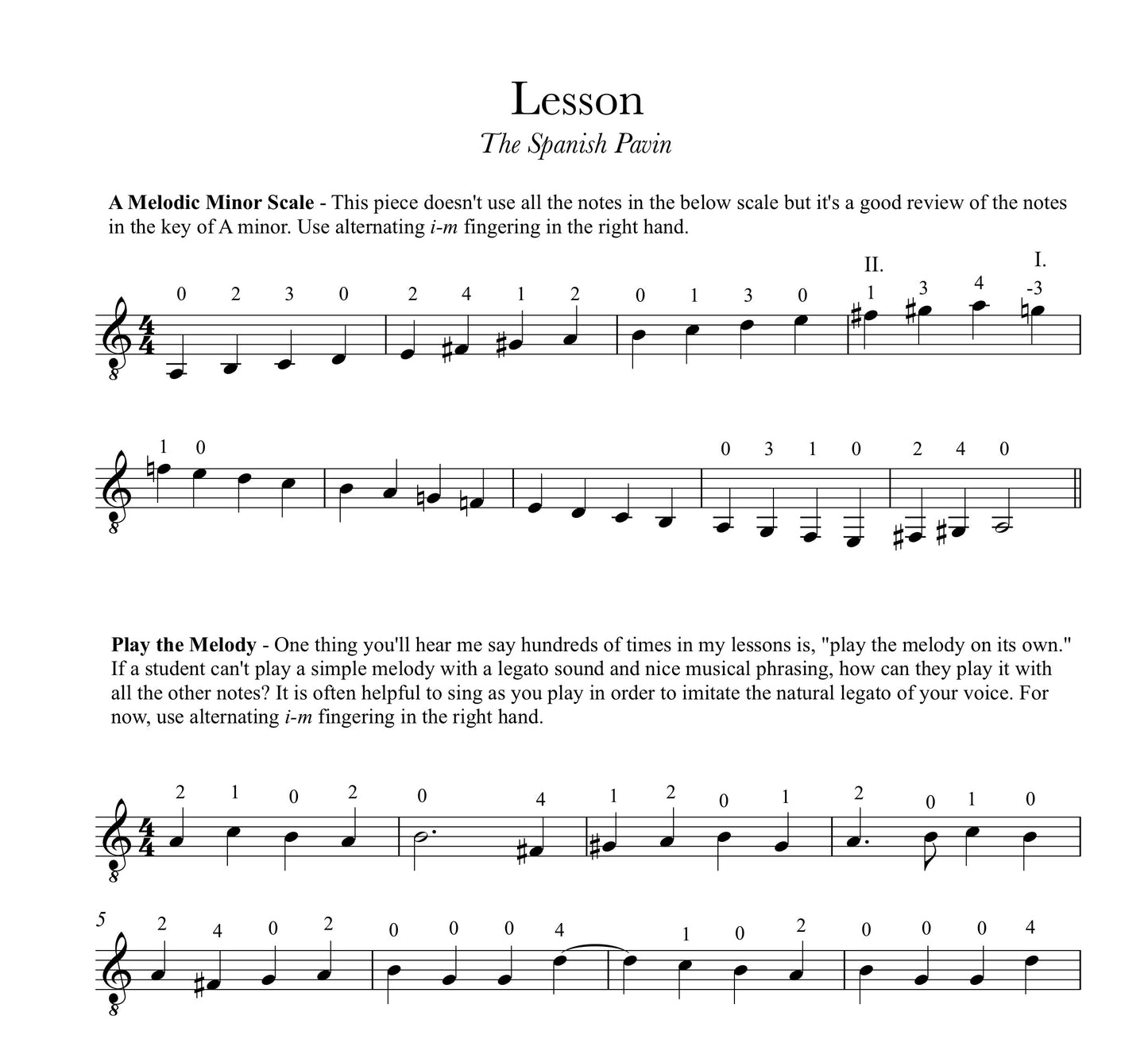
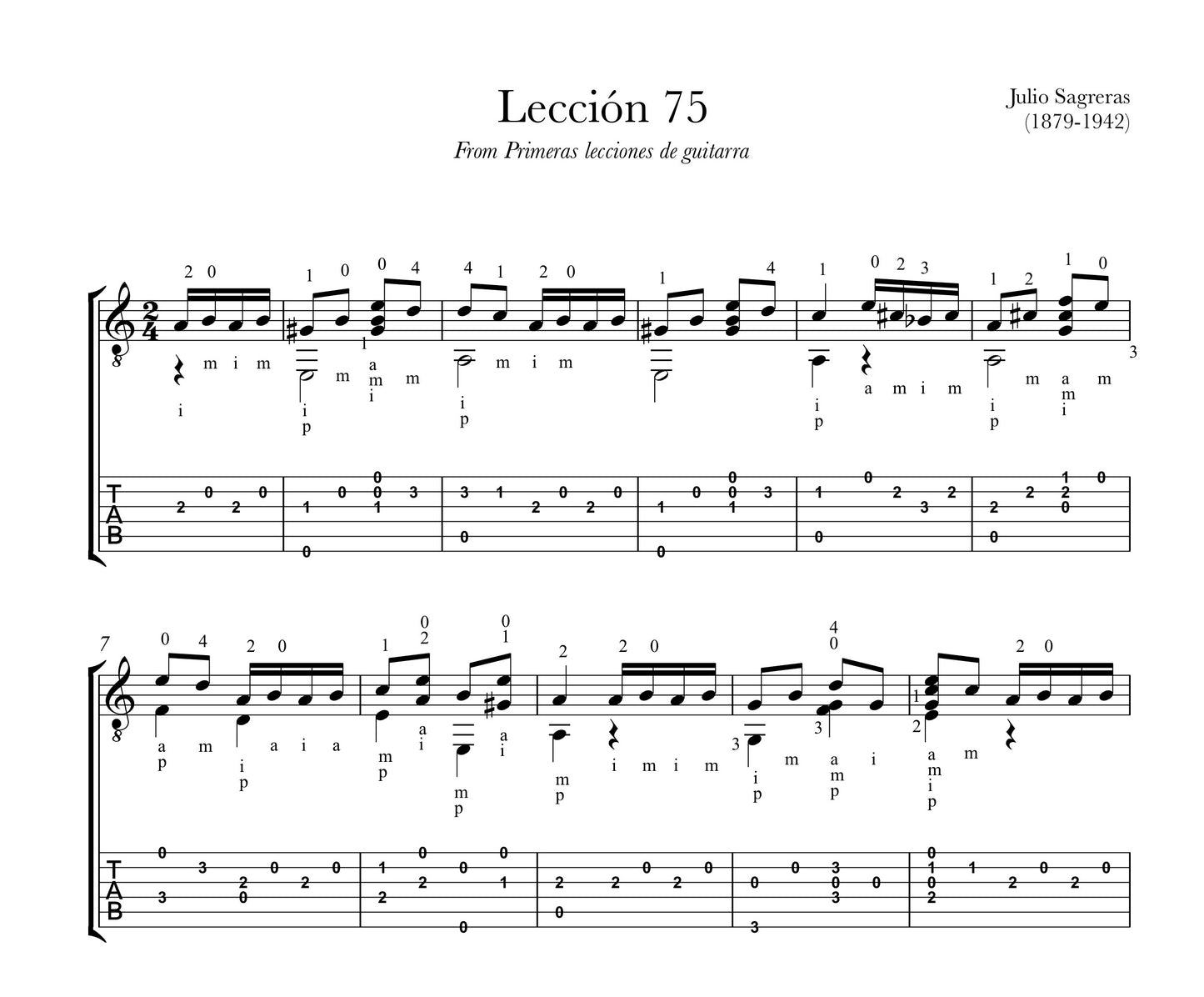
I bought the printed book already a year ago, after I tried to learn myself playing somehow classical guitar by the Classical Method books 1 and 2, and the very good videos. I noticed I was rushing through too quickly, and found finally a teacher to help me. So I bought an extra pdf-copy for the teacher. It is not easy to find a classical guitar teacher in my town, but my young jazz/pop teacher took the challenge and we start the Classical Guitar Repertoire Lessons together slowly from the very beginning, starting with the scales (and not skipping them anymore). My practicing manners are much better already and I am enjoying it at lot. Thank you Bradford for your excellent books and videos!
Glad to hear that, happy practicing.
I am a retired man with many years of amateur musical experience with brass, strings and woodwind instruments. Last year I decided to concentrate on two instruments I have had little or no experience with: piano and classical guitar, employing self-teaching materials. There are excellent methods and material available for both instruments. I came across Bradford Werner's This is Classical Guitar website and decided to use his methods and repertoire materials as supplemented by the wonderful video lessons which accompany them. This Classical Repertoire Grade 1 book continues the excellent and thorough tradition of the others I have been using, including Method Books 1 and 2, plus Classical Guitar Technique. After roughly four months of effort I find my progress very satisfying, limited only by the amount of time I am able to devote to guitar. Mr. Werner's devotion to providing this extraordinary body of teaching material, much of it at no cost, is exceptional and most admirable.
Thanks so much for the kind words and feedback. Happy practicing!
Hi! I'm from Korea, and I've been learning classical guitar in Seoul for just over 5 months now.
I'm doing a mix of two things: taking lessons from a teacher at a local academy, and following Bradford’s course at the same time. Having a tutor who can immediately point out and fix mistakes, plus working through Bradford’s clear and well-designed curriculum — it’s a great combo! I’m really starting to enjoy the process of learning guitar more and more.
I’ve finished Method V1, and I’m practicing regularly with the Technique book. Now I’m moving on to Repertoire G1 & G2 — exciting! I plan to keep learning step by step with Bradford’s program and just enjoy the journey.
Also, I’m hoping to travel to western Canada this fall — can’t wait!
Big thanks to Bradford for creating such a great program.
Thanks so much for your review! I really appreciate hearing about all your success. If you're in Victoria maybe we'll meet!
Really enjoying Bradford's books and videos. Great source for self-learning. With the help of his website I have progressed from complete beginner to probably about level 2 / 3. Only play for my own enjoyment, too old to have time left to become an expert.
Thanks so much for sharing your story and for all the kind words! I'm so glad the materials have been helpful!
I highly recommend this Grade 1 book of Brads. I’ve completed his Method books 1 and 2 and this book follows on nicely. The pleasant mix of lesson pieces are well chosen and organised in a progressive way, as is usual with Brads learning material. There are regular challenging parts that I find grows your ability, knowledge and enjoyment of the Guitar. Happy Days :)





